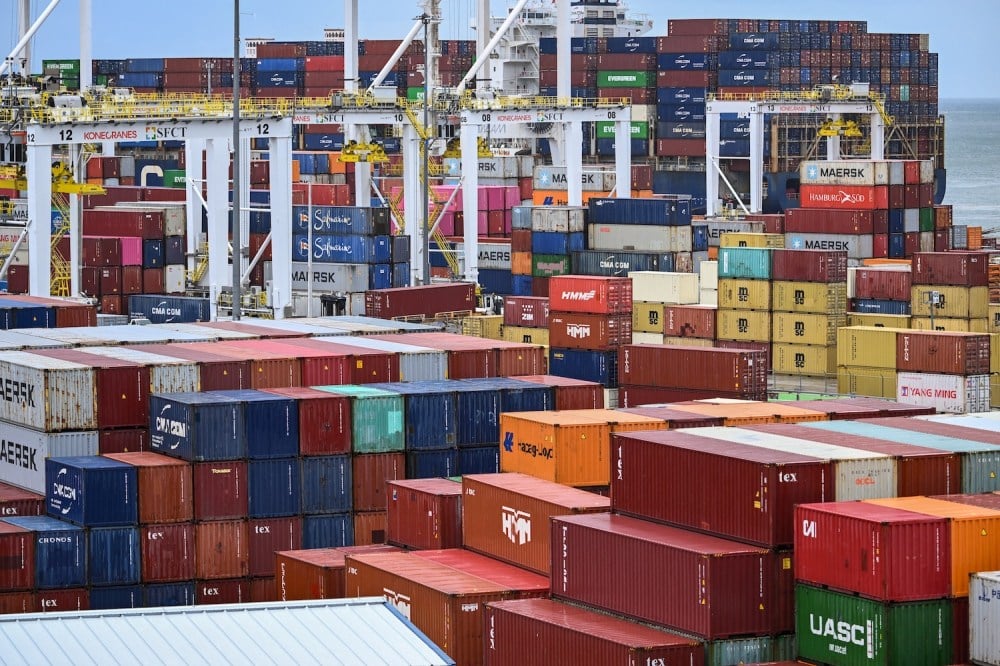Welcome back to World Brief, where we’re looking at the Trump administration’s sweeping tariffs taking effect, a potential upcoming meeting between the leaders of Russia and the United States, and Israel’s push to take over Gaza.
Widening Trade War
U.S. President Donald Trump’s punishing tariffs on more than 90 countries went into effect on Thursday, deepening economic uncertainty around the world and driving average U.S. import taxes up to the highest level since the Great Depression.
Welcome back to World Brief, where we’re looking at the Trump administration’s sweeping tariffs taking effect, a potential upcoming meeting between the leaders of Russia and the United States, and Israel’s push to take over Gaza.
U.S. President Donald Trump’s punishing tariffs on more than 90 countries went into effect on Thursday, deepening economic uncertainty around the world and driving average U.S. import taxes up to the highest level since the Great Depression.
The measures, announced last week in a series of executive orders, mark the latest escalation in a chaotic and unpredictable trade war that first erupted in April, when Trump imposed steep duties on much of the world and sent shock waves through global markets. Afterward, the White House announced a 90-day pause aimed at giving world leaders time to negotiate new trade agreements with Washington, but few deals were actually cut in that period.
Enter Trump’s so-called reciprocal tariffs, which kicked in immediately after midnight on Thursday and hit nearly all of the United States’ major trading partners. “BILLIONS OF DOLLARS, LARGELY FROM COUNTRIES THAT HAVE TAKEN ADVANTAGE OF THE UNITED STATES FOR MANY YEARS, LAUGHING ALL THE WAY, WILL START FLOWING INTO THE USA,” Trump declared in a post on Truth Social Wednesday night, shortly before the duties went into effect.
The new tariff rates range from 10 percent to a staggering 41 percent on Syria—levels that will be added on to standard import duties. Brazil and India were among the hardest hit by the new measures. Trump signed an executive order last week that would effectively drive up Brazil’s total tariff rate to 50 percent, prompting an outraged Brasília to seek a consultation with the World Trade Organization. The U.S. president also doubled tariff rates on India to a whopping 50 percent over New Delhi’s purchases of Russian oil, paving the way for a sharper trade spat between the two countries.
But Trump’s big moves didn’t appear to rattle global stock markets, which broadly rose on Thursday and actually appeared to shake off the impact of the tariffs kicking in. There are plenty of possible explanations for their nonchalance, FP trade reporter Keith Johnson told World Brief.
One potential reason? “Markets still believe in the not-crazy idea that Trump always backs down and does less than he threatens,” Johnson said. “There is also corporate resilience. Despite an avalanche of tariffs and trade obstacles otherwise, U.S. earnings through the second quarter were fine, even if job creation wasn’t.”
But the pain may soon come. “Next quarter, the experts suggest, is when earnings calls will feature wailing and gnashing of teeth,” Johnson said. “And then there is the fact that some of the really painful tariffs—on key sectors such as pharmaceuticals and semiconductors—are yet to land but probably will, except for all the carve-outs for privileged firms and special sectors.”
The markets may have been relatively calm, but impacted world leaders certainly were not. Indian Prime Minister Narendra Modi and Brazilian President Luiz Inácio Lula da Silva, whose countries now face some of the steepest new measures, spoke over the phone on Thursday. Brazil plans to see if other BRICS nations are interested in jointly responding to U.S. tariffs, Reuters reported.
“The day my intuition says Trump is ready to talk, I won’t hesitate to call him,” Lula told Reuters. “But today my intuition says he doesn’t want to talk. And I won’t humiliate myself.”
Possible Trump-Putin meeting. Following White House envoy Steve Witkoff’s meeting with Russian President Vladimir Putin on Wednesday, the Kremlin asserted that Trump and Putin plan to meet as early as next week to continue talks to end the war in Ukraine. Putin has suggested that the meeting could take place in the United Arab Emirates.
However, the Trump administration has pushed back on Moscow’s claim, with an unnamed White House official telling ABC News that no location had been agreed upon and that Putin must meet with Ukrainian President Volodymyr Zelensky for the Trump meeting to take place.
Ukrainian officials and experts worry that Moscow is pushing for a Putin-Trump meeting to sideline Ukraine from negotiations and give Russia a diplomatic advantage to achieve its strategic goals. “Putin is again trying to win time by making suggestions that won’t bring any just, sustainable and lasting peace,” Ukrainian lawmaker Ivanna Klympush-Tsintsadze told the Washington Post.
During his meeting with Putin on Wednesday, Witkoff raised the possibility of a three-way peace summit that would include Zelensky after the Putin-Trump meeting. However, Putin has appeared resistant to the idea, saying that “certain conditions” that would convince him to hold a trilateral meeting with Zelensky are still far away from being met.
Zelensky, for his part, has said that Ukraine is not afraid of meeting and that he expects the “same brave approach” from Moscow. “It is time we ended the war,” Zelensky said.
Control of Gaza. Israeli Prime Minister Benjamin Netanyahu said in an interview with Fox News on Thursday that Israel plans to take total control of Gaza, which would represent a marked shift in policy following Israeli withdrawal from the territory in 2005.
“We intend to control all of Gaza. We don’t want to keep Gaza. We want a security perimeter,” Netanyahu said, specifying that the intention is not to maintain permanent control but rather to transfer the civilian administration of Gaza to “Arab forces.” Soon after he made the comments, Netanyahu’s security cabinet met to consider the Gaza plan.
The idea is highly controversial in Israel and even among some of Netanyahu’s own top advisors, who worry that moving into Gaza’s densely populated areas could potentially endanger hostages and soldiers.
“We are not dealing with theory—we are dealing with matters of life and death, with the defense of the state, and we do so while looking directly into the eyes of our soldiers and citizens,” military chief of staff Eyal Zamir said.
Even if the security cabinet agrees to move forward with expanded military actions, it could take days or weeks to begin. Long-standing allies have also recently put more pressure on Israel to end the war and address the hunger crisis in Gaza instead of engaging in military escalation.
Cementing a cease-fire. Cambodia and Thailand formalized a cease-fire agreement on Thursday that will allow observers from the Association of Southeast Asian Nations (ASEAN) to monitor a disputed area of the two countries’ border to ensure that hostilities do not resume. Last month, the two countries engaged in a five-day conflict that involved exchanges of artillery fire and jet-fighter bombings, ultimately killing more than 40 people and displacing roughly 330,000 civilians. Both sides blamed the other for firing the first shot.
Before the formalized agreement, though, the cease-fire had “already begun to show serious signs of strain,” as international security specialist Rob McKee wrote in Foreign Policy yesterday, with both sides having accused the other of violating the agreement.
A zoo in Denmark put an unusual call out on social media last week to help procure a new food supply for its predators. The zoo is seeking unwanted pets—such as chickens, rabbits, guinea pigs, or small horses—nearing the end of their lives that can be “gently euthanized” and turned into feed. While some online reactors were perturbed by the morbid request, the zoo stated that this practice would help replicate the animals’ natural food chain. “This way, nothing goes to waste, and we ensure natural behavior, nutrition, and well-being for our predators,” the post said.




